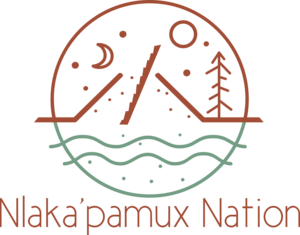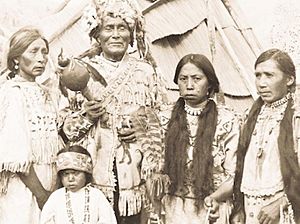Nlakaʼpamux facts for kids
| Total population | |
|---|---|
| 3,105 (2016 census) | |
| Regions with significant populations | |
| Canada (British Columbia), United States (Washington) |
|
| Languages | |
| English, Nlakaʼpamuctsin | |
| Religion | |
| Christianity (Anglicanism and Catholicism), Animism | |
| Related ethnic groups | |
| Okanagan, Nicola people, Nicola Athapaskans |
The Nlakaʼpamux or Nlakapamuk are an Indigenous First Nations group. They live in southern British Columbia, Canada. Their traditional lands also reach into parts of Washington state in the United States. They are part of the Interior Salish language family.
Contents
About the Nlakaʼpamux People
The Nlakaʼpamux people have been known by several names throughout history. Some old maps and records called them Hakamaugh or Klackarpun. They were also known as the Kootomin, Couteau, or Knife Indians.
In the Thompson language, which is their traditional language, the name can be said as Nlʼakapxm. This version is used by groups like the Ashcroft Indian Band.
Some Nlakaʼpamux people live in the Nicola Valley. They call themselves Scwʼexmx. They speak a slightly different version of the Thompson language. These groups, along with the Spaxomin people (who are part of the Okanagan people), are sometimes called the Nicola people.
Traditional Uses of Plants
The Nlakaʼpamux people have always used plants from their land. For example, they traditionally used blueberries (a type of Vaccinium myrtilloides) in pies. They also used the leaves of sedge plants (Carex) as brushes for cleaning things. Sedge was also used as food for their animals.
Beliefs and Spirituality
In the 1800s, Christian missionaries came to the Nlakaʼpamux lands. Both Anglican and Roman Catholic missionaries worked with the people. By the early 1900s, most Nlakaʼpamux people followed one of these two Christian faiths. Before this, they had their own traditional spiritual beliefs, including Animism.
Nlakaʼpamux Governments
The Nlakaʼpamux people have different groups that represent their communities. The Nlakaʼpamux Nation Tribal Council is one of these main groups. However, not all Nlakaʼpamux communities are part of it. Another important group is the Scwʼexmx Tribal Council.
The Lytton First Nation, also known as the Lytton Band, is a very large Nlakaʼpamux community. Its traditional name in the Nlakaʼpamux language is Camchin or Kumsheen. This community does not belong to any of the main tribal councils.
The Upper Nicola Band is part of the Scwʼexmx Tribal Council. But they are actually a Syilx community, not Nlakaʼpamux. They have their own traditional territory.
None of the Nlakaʼpamux governments are currently involved in the British Columbia Treaty Process. This is a process where First Nations and the government work to define rights and land use.
Nlakaʼpamux Nation Tribal Council Members
- Boothroyd Indian Band
- Boston Bar Indian Band
- Oregon Jack Creek Indian Band
- Spuzzum Indian Band
- Lytton Indian Band
- Skuppah Indian Band
Scwʼexmx Tribal Council Members
The Scwʼexmx Tribal Council was originally called the Nicola Tribal Association.
- Shackan Indian Band
- Nooaitch Indian Band
- Upper Nicola Band (This band is also part of the Okanagan Nation Alliance)
- Coldwater Indian Band
- Lower Nicola Indian Band
Communities Not Affiliated with Councils
Some Nlakaʼpamux communities are not part of these main tribal councils.
- Ashcroft Indian Band
- Kanaka Bar Indian Band
- Siska Indian Band
- Cook's Ferry Indian Band
- Nicomen Indian Band
Language of the Nlakaʼpamux
The Nlakaʼpamux people speak an Interior Salishan language. It is called nɬeʔkepmxcín in their language. In English, it is known as the Thompson language. The Scwʼexmx people who live in the Nicola Valley speak a dialect of this language, also called Scwʼexmx.
Notable Nlakaʼpamux People
Many Nlakaʼpamux individuals have made important contributions.
- G. A. Grisenthwaite, a writer
- Kevin Loring, a writer
- Terese Marie Mailhot, a writer
- Sharon McIvor, an activist
- Ilona Verley, a drag queen and make-up artist
- Annie York, a writer
See also
 In Spanish: Salish del Río Thompson para niños
In Spanish: Salish del Río Thompson para niños




